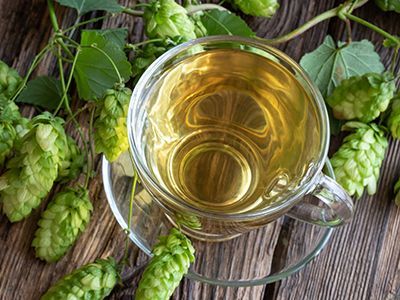A Guide to Overcoming Insomnia and Optimizing Sleep Quality
authored by Taylor Appel, Registered Herbalist (AHG)

Good quality sleep is essential for health. The restorative processes the body needs to recover and repair itself can only occur when we are experiencing deep, restorative sleep. Studies show that we need about 7.5 hours of uninterrupted sleep to feel well-rested and ready for the day ahead.1 Whether you are a night owl or love to be up at the crack of dawn, as long as you are getting enough time in quality sleep each night, you will feel the palpable benefits.
Unfortunately, a majority of the population is suffering from sleep disturbances like insomnia, which can drastically affect quality of life. Insomnia can present as a host of varying symptoms, including drastic changes in mood, irritability, and of course, extreme fatigue. The National Institute of Health reports that around 60 million adults in the United States alone suffer from insomnia and the debilitating side effects of this condition.1
What is Insomnia?
By definition, insomnia is a sleep disorder that is characterized by either the inability to fall or stay asleep, or by chronic non-restorative sleep patterns that leave an individual extremely fatigued and poorly functioning for at least four weeks.1 Insomnia can also appear as a comorbidity to many other diseases, often referred to as secondary insomnia, and should be treated the same as primary insomnia before it exacerbates other disease symptoms further.1

There are three primary classifications of insomnia:
- Chronic Insomnia Disorder: sleep disturbances for at least three months, at least three times per week
- Short-term Insomnia Disorder: sleep disturbances within the last three months’ time
- Transient Insomnia Disorder: sleep disturbances that last a few weeks’ time but are not long lasting2
Around 10% to 30% of the total population has been diagnosed with insomnia, with females being more predominantly affected than males.1 Other factors, such as having a medical disorder, psychiatric illness, and being a night-shift worker can also increase the risk of suffering from insomnia.1
Beyond the obvious energy depletion caused by insomnia, chronic lack of sleep can trigger a host of metabolic disruptions in the body. These include increased inflammation, disruption in hormone balance, diminished immune health, and even dysregulated glucose levels. Insomnia can be quite disabling on a multitude of levels when not appropriately supported. As summarized by Matthew Walker, PhD, author of Why We Sleep, “like water from a burst pipe in your home, the effects of sleep deprivation will seep into every nook and cranny of biology,” truly emphasizing the incredible importance of this restorative process.9
What Causes Insomnia?
There are many predisposing factors that can contribute to the development of insomnia, including lifestyle and dietary choices like consuming alcohol, nicotine, caffeine, or drugs. Other factors include the long-term use of certain medications that may affect sleep quality, having an illness associated with pain or discomfort that disrupts sleep, having other conditions such as restless leg syndrome or gastroesophageal reflux disease (GERD), plus other factors like work schedule and jet lag. Numerous hormonal influences, such as melatonin production, can also contribute to our ability to fall asleep and sleep efficiently on a regular basis.2 In addition, genetic factors that may be responsible for insomnia have also been identified.

Other causes of insomnia include precipitating and perpetuating factors. Precipitating factors refer to the stress associated with health, career, or family, and can also include most negative life challenges that leave an individual emotionally and physically stressed.1 Perpetuating factors that may cause insomnia to develop or worsen include behaviors that come about over time, such as excessive time spent in bed while awake, irregular waking schedule and bedtime, excessive caffeine, alcohol, and other drug intake, napping throughout the day, and anxiety around poor sleeping habits and quality, which further increases stress levels.1,2
Those diagnosed with insomnia are found to be at a higher risk of developing other health conditions, including neurological and gastrointestinal, as well as cardiovascular disease, obesity, cancer, depression, anxiety, diabetes, and may even have an increased risk of suicide.1,2 Luckily, through dietary and lifestyle changes, especially with the help of complementary therapies, relief from insomnia is possible, as is recovery from the lasting side effects of ongoing sleep deprivation.
Dietary Strategies to Manage Insomnia and Improve Sleep Quality
Studies suggest that individuals with underlying nutrient imbalances may be more likely to experience insomnia.1,3 Interestingly, poor sleep quality can also negatively affect our eating habits, leading to cravings, late-night eating, and poor food choices. The good news is we can support both the symptoms and root cause of insomnia by choosing healthy dietary habits that lead the way to more consistent nights of restorative sleep.
One of the keys to restorative sleep is regulating blood glucose levels throughout the day and especially before bedtime. Underlying food allergies or sensitivities should also be addressed, as these can impact sleep quality. Caffeine and alcohol consumption should be eliminated or restricted at least 3 to 4 hours before bedtime to help support healthy cortisol levels in the body. This hormone is intimately involved in our wake and rest cycles and is influenced by a variety of physiological and psychological factors. Dr. Susan Saccomanno, Mederi Center's Senior Practitioner, sums this up well:
“Another strong determinant of our ability to fall into a deep sleep is our cortisol rhythm. Cortisol is produced in the adrenal glands as part of the system that regulates our energy. A healthy pattern of cortisol is one that rises in the morning with the sun and acts as our “get-up-and-go”, and then slowly decreases throughout the day until it reaches a low point during the night so we can rest and rejuvenate…what I commonly see when people have insomnia is that nighttime levels are not dropping as they should and therefore the cortisol is keeping people awake.”8

Foods that Support Healthy Sleep
Many foods have been found to help support natural sleep cycles, due to their high content of melatonin-supporting nutrients or by naturally containing melatonin itself.3 These include:
- Tart cherry juice
- Walnuts
- Almonds
- Jujube
- Pistachios
- Turkey
- Chamomile
- Goji berries
- Kiwi
- Fatty Fish
- Pumpkin seeds
- Passionflower
- White rice3,4
Ultimately, limiting the intake of highly processed foods, artificial additives, refined carbohydrates, and excessive sugars is a good place to start when looking to support healthy sleep cycles with nutritional interventions. Another strategy for addressing sleep disturbances naturally is to follow an anti-inflammatory food plan. This style of eating offers a wide range of immune-boosting phytochemicals and nutrient-dense foods and can be fairly easy to implement for almost any budget or lifestyle. Simply include fresh, whole, organic foods into your diet each day as a proactive way to improve sleep quality.
Herbal Medicines that Support Healthy Sleep
Daily use of over the counter and prescription sleep-aid medications continues to gain in popularity among both adults and children. This also brings an alarming increase in the risk of developing certain cancers that may occur overtime from the prolonged use of some insomnia medications.1 Luckily, there are many options that can replace sleeping pills and hypnotic medications.
Nutritional supplements and botanical medicines are found to be increasingly supportive for those with any type of insomnia and various ongoing sleep disturbances.1,2 Research has highlighted the efficacy of numerous plant compounds for supporting healthy circadian rhythm and sleep efficiency. These plant-based medicines also boast fewer side effects than traditional sleeping medications and are found to be more effective with consistent use.1
Valerian Root (Valeriana officinalis)
Valarian root (Valeriana officinalis) possesses a wide range of sedative, analgesic (pain-relieving), anxiolytic (anxiety-reducing), and antispasmodic properties that contribute to its usefulness in treating those with insomnia and other sleep disorders. Take Valerian root as a deeply steeped tea before bed, using 1 Tbsp per cup (2-3 grams) of the dried root. It can also be taken as a tincture, 5-10 mL for more sedative effects and 2.5 mL for anxiety-like symptom relief, and should be taken for at least 2-4 weeks consistently to receive its full effects.1,5
Research emphasizes the volatile oils of this plant and their ability to effectively calm the nervous system, helping to ease even the most energized individuals into a restful slumber. Valerian is also found to be particularly effective for soothing muscle tension and cramping, which is useful in addressing restless-leg syndrome.
Caution is advised when taking Valerian with any other sedative or sleep-supporting pharmaceutical medications, so please discuss with your prescribing doctor before using this herbal medicine. It is also important to note that around 10% of individuals have a paradoxical effect from Valerian, where consuming it can cause more of a stimulatory effect and should therefore not be used for these cases of insomnia.5

Hops (Humulus lupus)
Hops (Humulus lupus) is another viable therapeutic option for addressing insomnia and ongoing, poor-quality sleep. This botanical medicine is the same plant family as Cannabis, without the psychoactive effects, and is the primary plant used to produce beer, another naturally sedative substance. Hops has been researched for its hypnotic effects, as well as for its ability to reduce muscle tension throughout the body. It is also found to be supportive for hot flashes and other symptoms associated with stages of menopause.1
Hops can specifically help those experiencing sleeplessness from worry, anxiety, digestive upset, and headaches.5 Drink an infusion of 1 tsp dried hops per cup of tea before bed, or you can take 2-3 mL of the tincture each day, with a 40 mL weekly maximum, to help support healthy sleep patterns.
You can also utilize a “hops pillow” to support restful sleep. To do this, stuff dried hops plant material into a piece of fabric, cinch or fasten it close, and sleep with it under your pillow. Try adding dried lavender flowers for a calming scent and relaxant effect. Avoid hops if experiencing ongoing depression and further discuss with your health care team before adding onto your existing routine to determine if this herbal medicine is right for you.1,5

Additional Botanicals that Promote Healthy Sleep
Skullcap (Scutellaria lateriflora)
Traditionally, this plant was used as a sedative and nervine tonic and has been shown to support various nervous system disorders including anxiety, stress, and tension during the premenstrual period. Research highlights the neuroprotective ability of this plant, helping to enhance mood for those with depression and other neurodegenerative disorders, such as Alzheimer’s and Parkinson’s disease. It has also been found to support muscle spasms, a commonly reported sleep disturbance.5
Passionflower (Passiflora incarnata)
This beautiful botanical has many functional phytochemicals that contribute to its relaxant properties. Passionflower was used in Traditional Chinese Medicine to deeply nourish the heart center and calm the spirit. Similarly, it was used in Native American Medicine as an herbal remedy to relax the mind and body. Modern research has illuminated the incredibly potent alkaloids present in Passionflower, including indole and flavonoids like chrysin, which both have potent sedative effects on the body. Chrysin in particular also helps modulate GABA (gamma-aminobutyric acid) reuptake in the body, allowing us to sleep more soundly and deeply. GABA is the only inhibitory neurotransmitter in the body, and therefore we need it to be able to relax.
Nutrients that Promote Restful Sleep
In addition to therapeutic botanicals, there are many nutrients that can have a tremendous impact on our sleep quality and quantity, each providing a particular type of support. Many of these nutrients can be found naturally in whole foods, as well as in botanicals, but can also be supplemented to address current and on-going sleep concerns. These key nutrients for sleep include:
Glycine
This non-essential amino acid has been found to play a key role in the downregulation of the nervous system, as well as contributing to a thermodynamic effect, slightly lowering the core body temperature, and improving the sleep quality for those with insomniac tendencies. Having a lower core body temperature is directly associated with more optimal sleep patterns, and as studies highlight, the use of oral glycine supplementation may prolong this thermoregulatory effect throughout the night, allowing for more efficient and uninterrupted sleep cycles.13 Unlike other hypnotics or sleep-inducing foods and herbs, glycine itself does not produce sleepiness and is safely taken during the day without causing drowsiness. Glycine produces a gentle, calming sensation that supports natural, restorative sleeping patterns.
L-Theanine
Commonly found in green tea, this amino acid is responsible for calming the nervous system and reducing anxious feelings in the body. Hence, why a cup of green tea tends to not give us the jitters like other caffeinated beverages. L-theanine works by producing a type of tranquilizing effect to the nervous system and even helps to reduce blood pressure, adding to the calming effect of this amino acid. L-theanine also supports GABA regulation, a neurotransmitter that is vital for down-regulating the nervous system. Poor GABA production is associated with insomnia and other types of sleep-related conditions.11
5-HTP (5-Hydroxytryptophan)
This compound is a precursor to serotonin, another very important neurotransmitter. Serotonin, besides helping us to feel happier, is intimately involved in the production of melatonin, a hormone that is critical for healthy sleep-wake cycles. 5-HTP has been found to have potential anti-inflammatory and antioxidant effects, and may help support depression, anxiety, and panic-related disorders. Although 5-HTP is naturally derived from tryptophan, an amino acid found in many foods and herbs known also to support sleep, 5-HTP supplementation can be used to better optimize and increase deep sleep and REM sleep cycles, as highlighted in various studies.12
Lifestyle Tips for Managing Insomnia and Improving Sleep Hygiene
“The best cure for insomnia is sleep.”1 This famous quote by W.C. Fields really personifies the importance and irreplaceability of sleep. But try saying that to someone suffering from chronic insomnia! Luckily, we can be proactive in following healthy sleep hygiene habits that will contribute to more restorative sleep and better health overall.
There are a few key areas to consider when creating a more supportive sleep routine that will increase your sleep efficiency, or the ratio of total time asleep to total time spent in bed and allow you to feel exponentially more refreshed upon waking. Some of my personal favorites are:
- Make the bedroom as dark as possible, unplug electronics and Wi-Fi, cover any lights from devices/switches that may be shining in the room, and use light-blocking curtains if exposed to streetlamps.
- Decrease the temperature in the bedroom to at least 68 degrees or use a fan to cool the space. Studies show that a colder sleeping environment is more ideal for restorative sleep patterns.10
- Minimize blue light exposure for at least 2 hours before bed (TVs, phones, computers, etc.). This allows for proper melatonin levels to be established so we can sleep throughout the night. Mederi Center’s Dr. Susan Saccomanno reminds us that:

“Our natural melatonin is only produced in total darkness (where you cannot see any objects in the room or your hand 6 inches away from your face).”7
- Have clean air in the bedroom. Open a window or use an air filter if needed, especially if living in areas with higher pollution or prone to have a fire (smoke) season.
- Make your bed as comfortable as possible with quality bedding and pillows, choosing organic when possible, and other natural fibers.10
- Have a regular sleep-wake schedule, even on weekends and vacations, to help with sleep cycle consistency.
- Sleep alone, without a partner or dog/pet in bed with you, if possible. Those that share beds are innately more likely to have disturbed sleep. If possible, try separate beds, even for a few times per week, to minimize waking episodes throughout the night and optimize our sleep efficiency.10
- Only utilize the bedroom for sleep and sexual activities and avoid working in bed. This can cause bad habits and associations to form with the bedroom, contributing to insomnia and other sleep disturbances.
- Journal or practice stress reduction techniques before bed to relax the mind and body. Gentle stretching and somatic body movements can be highly supportive for those who have trouble falling asleep. Some of these sleep-supporting moves can even be done while lying in bed!
- Make your bedroom your sanctuary. Add essential oils, calm lighting and decor, and other objects that make you feel grounded and relaxed.
Other helpful tips for maximizing your sleep quality are to remember to stay active each day, take care of yourself with good personal hygiene practices, and support your emotional health with creative outlets, social interaction, and professional support, when needed.
When You Need Emotional Support
Our emotional well-being plays a huge role in our ability to achieve efficient and restorative sleep. As stress from school, work, family, health, and other factors comes into play, our bodies, specifically our minds, tend to take most of the burden. Circular thoughts keeping us up at night -- the worry of all our daily responsibilities, the fear of letting others down or not showing up how we would like, etc., are all common worries that can contribute to insomnia and other sleep disturbances. Unfortunately, these self-reflections tend to occur at night when we are trying (sometimes desperately) to get the sleep we need.

If you’ve been suffering with insomnia or other sleep disturbances, you may want to consider working with a therapist who can help you learn techniques to quiet the mind or overcome the underlying causes to whatever may be interfering with your sleep. As stated prior, stress plays an enormous role in the pathology of insomnia, so proactively working with a therapist to address these stressors can help you make tremendous strides toward recovery and more restorative sleep cycles. Therapy also provides a safe place to express emotions, trepidations, and more, leading to a clearer consciousness and more restful sleep.1,6
Additional Therapies for Sleep
Acupuncture and other body massage therapies can be incredibly supportive for experiencing more restorative sleep. Both modalities promote the restoration and relaxation of the nervous system and may also help relieve other symptoms contributing to disturbed sleeping patterns, such as pain and inflammation.
To Summarize
While the perfect night’s sleep may seem elusive, we can help our bodies restore healthy sleep by proactively optimizing our bedtime routine, making healthy food choices, supplementing with botanical medicines and therapeutic nutrients, and properly managing other contributing mental or physical health conditions. Every individual’s experience with insomnia and other sleep disturbances is unique, but with each healthy lifestyle choice you make, you are taking an empowering step toward cultivating more efficient sleeping patterns.
Join the Mederi Center community by signing up for our email list! We send several emails a month with product promotions for patients, practical tips for healthy living, blogs written by our practitioners, information about events, and other news. You can unsubscribe at any time.
References
- David Rakel. Integrative Medicine E-Book. Vol 3rd ed. Saunders; 2012. Accessed February 18, 2023. https://search-ebscohost.com.scnmlib.idm.oclc.org/login.aspx?direct=true&db=nlebk&AN=475747&site=ehost-liveS
- Meng X, Li Y, Li S, et al. Dietary Sources and Bioactivities of Melatonin. Nutrients. 2017;9(4):367. Published 2017 Apr 7. doi:10.3390/nu9040367
- Halson SL. Sleep in elite athletes and nutritional interventions to enhance sleep. Sports Med. 2014;44 Suppl 1(Suppl 1):S13-S23. doi:10.1007/s40279-014-0147-0
- Yoneyama S, Sakurai M, Nakamura K, et al. Associations between rice, noodle, and bread intake and sleep quality in Japanese men and women. PLoS One. 2014;9(8):e105198. Published 2014 Aug 15. doi:10.1371/journal.pone.0105198
- Marciano, M., & Vizniak, N. A. (2015). In Evidence informed Botanical Medicine. essay, Professional Health Systems Inc. Accessed 2/19/2023.
- Worthen M, Cash E. Stress Management. [Updated 2022 Aug 22]. In: StatPearls [Internet]. Treasure Island (FL): StatPearls Publishing; 2022 Jan-. Available from: https://www.ncbi.nlm.nih.gov/books/NBK513300/8.
- https://medericenter.org/resources/blog-dr-su/tools-for-supporting-healthy-sleep.html
- https://medericenter.org/resources/blog-dr-su/how-much-sleep-do-we-really-need.html
- Walker, Matthew. Why We Sleep: The New Science of Sleep and Dreams. Simon and Schuster.2017
- Okamoto-Mizuno K, Mizuno K. Effects of thermal environment on sleep and circadian rhythm. J Physiol Anthropol. 2012;31(1):14. Published 2012 May 31. doi:10.1186/1880-6805-31-14
- Yance, D. R. (2013). Adaptogens in medical herbalism: Elite herbs and natural compounds for mastering stress, aging, and chronic disease. Healing Arts Press.
- Maffei ME. 5-Hydroxytryptophan (5-HTP): Natural Occurrence, Analysis, Biosynthesis, Biotechnology, Physiology and Toxicology. Int J Mol Sci. 2020;22(1):181. Published 2020 Dec 26. doi:10.3390/ijms22010181
- Bannai M, Kawai N. New therapeutic strategy for amino acid medicine: glycine improves the quality of sleep. J Pharmacol Sci. 2012;118(2):145-148. doi:10.1254/jphs.11r04fm


